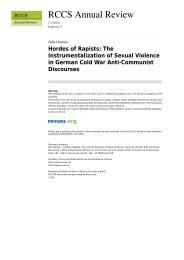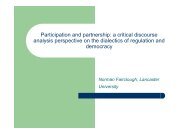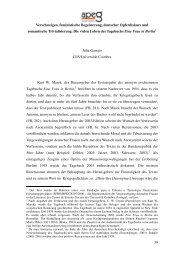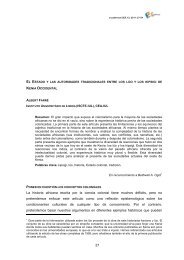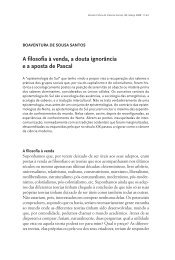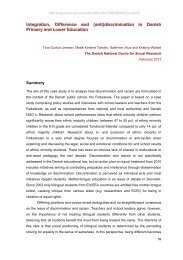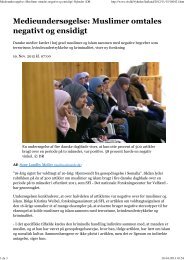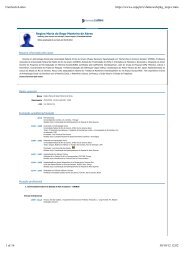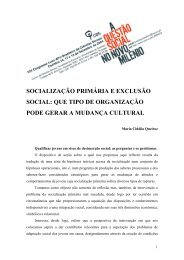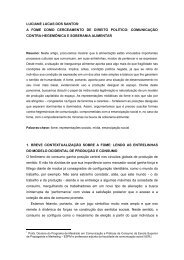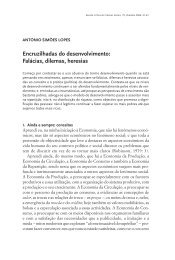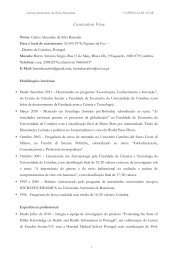Analysis of Integration Policies and Public State-Endorsed ...
Analysis of Integration Policies and Public State-Endorsed ...
Analysis of Integration Policies and Public State-Endorsed ...
Create successful ePaper yourself
Turn your PDF publications into a flip-book with our unique Google optimized e-Paper software.
Working paper produced within the TOLERACE project<br />
Active participation in society, including political process, is a central theme<br />
in the Danish integration policies. Since 1981 immigrants <strong>and</strong> refugees have had the<br />
right to vote <strong>and</strong> run for election on municipal <strong>and</strong> regional level after three years <strong>of</strong><br />
legal residence (four years since August 2010 due to changes in the <strong>Integration</strong> Act<br />
<strong>and</strong> other related laws). In 1983 the government established the Council for Ethnic<br />
Minorities (Rådet for etniske minoriteter) which has representatives from diverse<br />
associations for immigrants. The primary task <strong>of</strong> the council is to advise the Minister for<br />
Refugee, Immigration <strong>and</strong> <strong>Integration</strong> Affairs on issues <strong>of</strong> importance to refugees <strong>and</strong><br />
immigrants (<strong>Integration</strong> Act § 43). Furthermore, local councils in the municipalities may<br />
set up <strong>Integration</strong> Councils, which may give advisory opinions on the general effort <strong>of</strong><br />
integration in the municipality (<strong>Integration</strong> Act § 42). The <strong>Integration</strong> Councils have no<br />
legal competence.<br />
2.1. Key discourses within Danish integration policy<br />
The stated objective <strong>of</strong> the <strong>Integration</strong> Act (§ 1) is to ensure that newly arrived<br />
foreigners are given the possibility <strong>of</strong> using their abilities <strong>and</strong> resources to become<br />
involved as contributing citizens on equal footing with other citizens <strong>of</strong> Danish society.<br />
This must be done via an effort <strong>of</strong> integration which:<br />
a) is based on the responsibility <strong>of</strong> each individual foreigner to integrate into<br />
Danish society (amendment to the Act as <strong>of</strong> August 2010)<br />
b) assists to ensure that newly arrived foreigners can participate in the life <strong>of</strong><br />
society in terms <strong>of</strong> politics, economy, employment <strong>and</strong> social, religious <strong>and</strong><br />
cultural activities on an equal footing with other citizens<br />
c) assists in making newly arrived foreigners self-supporting as quickly as possible<br />
through employment<br />
d) imparts to the individual foreigners an underst<strong>and</strong>ing <strong>of</strong> the fundamental values<br />
<strong>and</strong> norms <strong>of</strong> Danish society<br />
The law <strong>and</strong> the integration policy as such have been criticised from various sides for<br />
being imprecise concerning the definition <strong>of</strong> integration <strong>and</strong> the longer-term goals <strong>of</strong> the<br />
integration process (Hamburger, 1990, Ejrnæs, 2001). Furthermore, it is noted that the<br />
policy points in apparently divergent or even self-contradictory directions; while on the<br />
one h<strong>and</strong> emphasizing cultural sameness, on the other h<strong>and</strong> it emphasizes equal<br />
rights, equal opportunities <strong>and</strong> self-reliance (Ejrnæs, 2001 & 2002; Hedet<strong>of</strong>t, 2006a). In<br />
the objects clause alone three different underst<strong>and</strong>ings <strong>of</strong> integration or three different<br />
56



